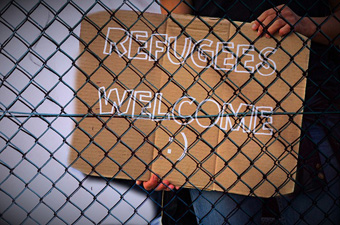GOT QUESTIONS
How should Christians respond to the refugee crisis?
By S. Michael Houdmann, Got Questions Ministries
What does the Bible teach about refugees?
Exodus 22:21, "You shall not wrong a sojourner or oppress him…"While a refugee is not precisely the same thing as an immigrant/sojourner, the principle definitely applies. We are to show love, mercy, and compassion towards refugees. We are to treat them how we would want to be treated if we were in their situation (Matthew 7:12).
Leviticus 19:33-34, "When a stranger sojourns with you in your land, you shall not do him wrong. You shall treat the stranger who sojourns with you as the native among you, and you shall love him as yourself…"
Matthew 25:35, "...For I was hungry and you gave me food, I was thirsty and you gave me drink, I was a stranger and you welcomed me..." (see Matthew 25:31-46)
But, before we condemn the Hungarians or praise the Germans, we need to make sure we understand what is truly happening and thereby ensure that our viewpoint is fully informed.
Likely a significant majority of the refugees are true refugees. They are fleeing the civil war in Syria or other war-torn parts of the Middle East. They are simply looking for a place where they can live peaceful lives and safely raise their families. In comparison to the Middle East, Europe is a bastion of peace. Western Europe has not experienced a significant military conflict since World War 2. Virtually every European country is stronger economically than virtually every country in the Middle East. It is entirely understandable why people would want to flee to Europe.
At the same time, in the midst of the true refugees, there are significant numbers of two other types of people: (1) those who want to leech off of Europe's socialistic policies, especially the universal healthcare and government supplied housing, and (2) terrorists who are hiding among the refugees in an attempt to enter Europe undetected.
While many Europeans are rightly stirred by compassion and wanting to help those in need, I can also understand the hesitance of many people in Europe not wanting hundreds of thousands of people from the Middle East suddenly moving in. The vast majority of the refugees are poor, uneducated, and ill-equipped to become productive members of society. Add to that the fact that most of the refugees are Muslim and you get a severe culture clash. Many Europeans are probably thinking, "Why should we welcome people into our country when they hate what our country stands for, have no intention of assimilating, and simply want to mooch off the government programs we have spent our entire lives paying for?"
The situation in Europe with the refugee crisis is not that different from what the USA experiences almost constantly on its southern border. How can a country let in the people who simply want to provide for their families without letting in the welfare seekers and criminals? So far, no country has found a perfect answer. "Let no one in" is not a merciful practice. "Let everyone in" is not a wise practice. The answer is somewhere in between.
So, what is the solution? The more I think about this, the more I realize that I don't have a perfect solution, just as I don't have a perfect solution to the immigration problem on the US southern border.
I guess my point is that compassion and wisdom are not mutually exclusive. Discretion and mercy are not contradictory concepts. Yes, we are absolutely to minister to true refugees. But, we need to balance that with discerning between people in genuine need and people trying to game the system with selfish and/or nefarious intent (Ephesians 5:13; 2 Thessalonians 3:10; 1 Timothy 5:8).
Image Credit: bykst; untitled; Creative Commons
Tags: Biblical-Truth | Christian-Life | Controversial-Issues | Current-Issues | Hardships | Political-Issues
comments powered by Disqus
Published 11-5-15

